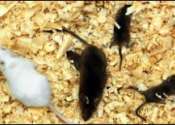Psychologists closing in on causes of claustrophobic fear
We all move around in a protective bubble of "near space," more commonly known as "personal space." But not everyone's bubble is the same size. People who project their personal space too far beyond their bodies, or the norm ...
Apr 12, 2011
0
0






